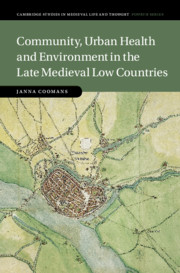
-
Select format
-
- Publisher:
- Cambridge University Press
- Publication date:
- August 2021
- August 2021
- ISBN:
- 9781108924344
- 9781108831772
- 9781108927161
- Dimensions:
- (229 x 152 mm)
- Weight & Pages:
- 0.66kg, 352 Pages
- Dimensions:
- (229 x 152 mm)
- Weight & Pages:
- 0.509kg, 352 Pages
You may already have access via personal or institutional login
Book description
By exploring the uniquely dense urban network of the Low Countries, Janna Coomans debunks the myth of medieval cities as apathetic towards filth and disease. Based on new archival research and adopting a bio-political and spatial-material approach, Coomans traces how cities developed a broad range of practices to protect themselves and fight disease. Urban societies negotiated challenges to their collective health in the face of social, political and environmental change, transforming ideas on civic duties and the common good. Tasks were divided among different groups, including town governments, neighbours and guilds, and affected a wide range of areas, from water, fire and food, to pigs, prostitutes and plague. By studying these efforts in the round, Coomans offers new comparative insights and bolsters our understanding of the importance of population health and the physical world - infrastructures, flora and fauna - in governing medieval cities.
Awards
Winner, 2025 John Nicholas Brown Prize, The Medieval Academy of America
Reviews
‘It is thoughtfully and inventively theorized, with an original interpretation solidly grounded in primary sources … Coomans provides a useful demonstration of how public health initiatives and principles could be implemented in places with different sociopolitical realities. The book is a regional case study rooted in a range of primary source genres but should be valuable to urban historians of other regions and periods as well. Coomans explicitly avoids facile comparisons with the failures and successes of contemporary public health strategies. She engages thoughtfully, however, with the conspicuously relevant questions of how multifaceted and decentralized public health strategies can be effective and the implications of conceptualizing public health as a common good.’
Lucy C. Barnhouse Source: H-Sci-Med-Tech
‘This work demonstrates the rich potential of further research in this context, perhaps exploring intersections with rural settings and testing ideas in relation to diverse case studies. Those who take up this challenge will find Coomans’s study to be an indispensable and rewarding point of departure.’
Jane Stevens Crawshaw Source: Speculum: A Journal of Medieval Studies
Contents
Metrics
Altmetric attention score
Full text views
Full text views help Loading metrics...
Loading metrics...
* Views captured on Cambridge Core between #date#. This data will be updated every 24 hours.
Usage data cannot currently be displayed.
Accessibility standard: Unknown
Why this information is here
This section outlines the accessibility features of this content - including support for screen readers, full keyboard navigation and high-contrast display options. This may not be relevant for you.
Accessibility Information
Accessibility compliance for the PDF of this book is currently unknown and may be updated in the future.


